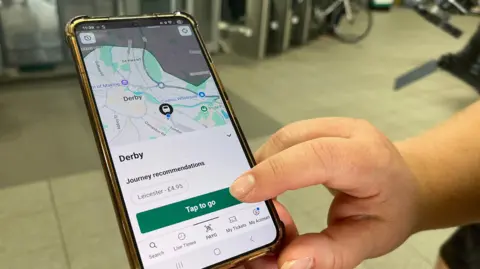Ticketless train travel using GPS to be trialled across East Midlands
Department for Transport rolls out 'Digital Pay As You Go' app in Derby, Leicester and Nottingham; further trials planned in Yorkshire
A ticketless train travel system that uses mobile phone location data to calculate and charge fares will be trialled in the East Midlands from Monday, the Department for Transport said.
East Midlands Railway (EMR) will invite up to 1,000 passengers to take part in the initial phase of the Digital Pay As You Go trial on services running through Derby, Leicester, Nottingham and the stations in between. The experiment aims to automatically charge travellers the most economical combination of fares at the end of each day.

The app uses global positioning system (GPS) tracking on users' mobile phones to record journeys. According to the Department for Transport, the system will calculate whether multiple journeys made in a day would be cheaper as separate fares or under a season-style ticket and charge passengers accordingly. For the purposes of on-board checks and access through ticket barriers, the app can generate a scannable barcode.
The government said the trial will also operate on CrossCountry services as well as EMR routes. Separate trials involving a further 1,000 passengers will take place on three services run by Northern in Yorkshire from the end of September, the department added.
Passengers interested in taking part in the East Midlands trial have been invited to sign up through EMR’s website. Participants will download the Digital Pay As You Go app and consent to location tracking for the duration of the trial. The Department for Transport said the trial is intended to test the technology’s accuracy, the passenger experience and fare calculation logic under real-world conditions.
The system is presented as an extension of existing digital ticketing and contactless options on Britain’s rail network, which already allow travellers to use mobile tickets or bank cards for pay-as-you-go journeys in some areas. Transport officials say the new approach simplifies journeys by removing the need to buy or validate a separate ticket for each trip and by ensuring passengers are not overcharged when making multiple trips in a day.
Rail operators and the Department for Transport will monitor how the app performs on busy commuter routes, at interchanges and through station barriers. The trial will be used to assess the reliability of GPS-based detection in areas where signal coverage is variable, such as in tunnels, deep platform canopies or dense urban environments, and to identify any mismatches between recorded locations and actual journeys.
The department did not disclose detailed technical specifications for how location data will be stored, processed or retained beyond saying the app relies on GPS tracking. It said fare calculations will be made at the end of each day and that passengers will be able to present the app’s barcode for inspections. EMR has been named as the sign-up point for the East Midlands trial, and Northern as the operator running the subsequent Yorkshire trials.
Ticketless systems that rely on location information raise practical and regulatory questions about passenger privacy and data security, and those considerations are commonly addressed in trial settings. The Department for Transport said the trials will provide information on operational risks and user acceptance that will inform any decisions about rolling out the technology more widely.
If the pilots demonstrate reliable fare calculation and acceptable passenger experience, operators and officials will consider next steps for potential wider deployment. Decisions about expansion would depend on the trials’ technical results, passenger feedback and compliance with data protection and transport regulations.
The trials form part of ongoing efforts to modernise rail ticketing in Britain, seeking to make fare payment quicker and more flexible for passengers travelling across different services and operators. By testing automated, location-based fare aggregation, the Department for Transport and participating operators are exploring whether the approach can reduce the friction of buying and validating tickets while ensuring passengers pay the best available fare for their travel.
Detailed results from the EMR trial and the subsequent Northern trials are expected to be published after the pilots conclude and the Department for Transport and operators have had time to review operational data and participant feedback. In the meantime, travellers can find sign-up information and trial terms on the EMR website.